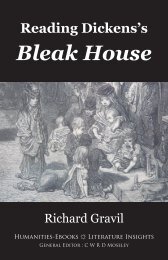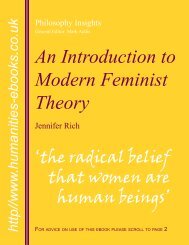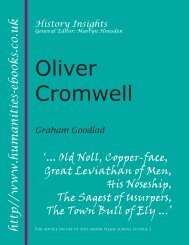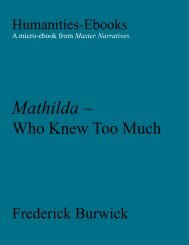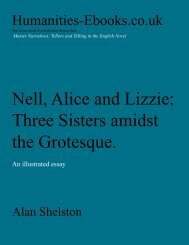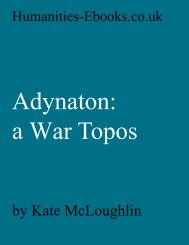William Shakespeare - Humanities-Ebooks
William Shakespeare - Humanities-Ebooks
William Shakespeare - Humanities-Ebooks
You also want an ePaper? Increase the reach of your titles
YUMPU automatically turns print PDFs into web optimized ePapers that Google loves.
Preface<br />
Like much in the modern world, Hamlet has acquired a tendency to become obese. In<br />
the Arden 2 <strong>Shakespeare</strong>, Harold Jenkins’s edition was twice the width of every other<br />
play; in Arden 3, Ann Thompson’s and Neil Taylor’s edition is in two volumes, jointly<br />
twice as wide as Jenkins’s one, and such remorseless bulking is an unhappy trend.<br />
The play can also expand in performance: a fine 2001 Royal <strong>Shakespeare</strong> Company<br />
(RSC) stage-production (directed by Steven Pimlott and starring Sam West) ran over<br />
four hours with two intervals, and Kenneth Branagh’s 1996 film-adaptation, lasting<br />
a whopping 242 minutes, is rarely watched from start to finish, especially in one go.<br />
Still more off-puttingly for students, Hamlet criticism has the same expansiveness.<br />
This Literature Insight is determinedly short. Great need not mean ponderous,<br />
and on stage Hamlet (like most <strong>Shakespeare</strong>) almost always does better at a brisk<br />
canter than a solemn march. In dealing with something as complex as the world’s<br />
premier Early Modern tragedy simplicity is not always useful; straightforwardness<br />
and cogency almost always are, so scholarly problems are ruthlessly relegated to<br />
references, while links in the bibliography make available to interested readers the<br />
primary materials, that they may see for themselves what the evidence supports.<br />
Casting matters are trickier, for there is almost no evidence about the first casting of<br />
any of <strong>Shakespeare</strong>’s plays, and most of what is said is pure speculation. But someone<br />
first played each role, and a pool of most probable names is known: so the game<br />
can be compulsive. It is in no way necessary, but a grasp of the practical necessities<br />
and constraints <strong>Shakespeare</strong> faced in writing (which for a working playwright of his<br />
kind means casting) is very helpful, and inevitably brings more speculative territory<br />
into view. So sometimes I speculate, but only in footnotes or link-text, and in Part 6,<br />
where it is properly flagged and discussion can be as careful as it need.<br />
Plot-summaries etc. are widely available, so I assume readers have read Hamlet<br />
at least once and know what happens. The only special thing readers—particularly<br />
those without theatrical experience—are asked to do is to think seriously about the<br />
<br />
<br />
There have been three series of Arden editions: the second appeared 1946–82, the third began to<br />
appear in 1993.<br />
‘Early Modern’: for historians, the period 1500–1700; ‘Modern’ = 1700–present.







